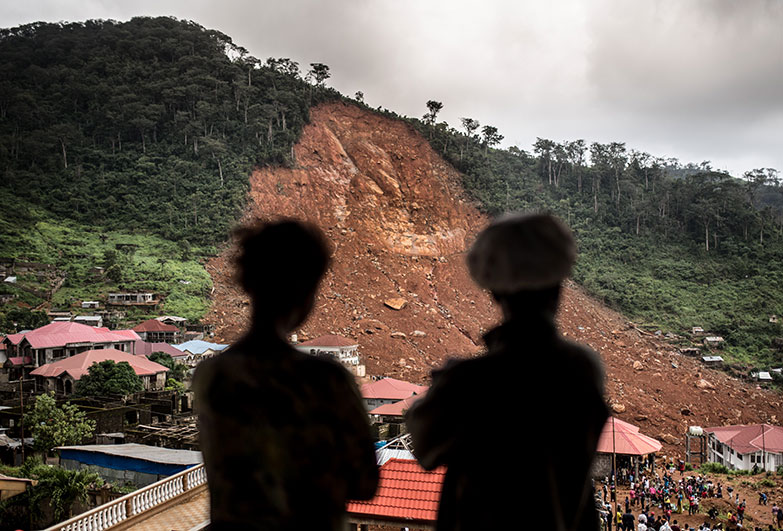
TOWARDS COP28: WHY THE UN CLIMATE NEGOTIATIONS MUST CONSIDER FORCED LABOUR AND HUMAN TRAFFICKING
As our planet faces the extreme threat of climate change, we know that people are more vulnerable to the combined risks of climate change and modern slavery. At Anti-Slavery International, over the past two years, we have been advocating to governments and international bodies to recognise and address the links between climate change and modern slavery. In this article, our Climate Change Manager Chiara Soletti explains more about the work of Anti-Slavery International.
Earlier this year, the Intergovernmental Panel on Climate Change (IPCC) – the body of experts assigned by the United Nations with the task of assessing climate change using science-based evidence – published its 6th assessment report. The message is incredibly stark. It found that the climate crisis is intensifying, which will mean devastating impacts on people’s livelihood, safety and basic rights. Despite these urgent warnings, we are still not seeing the action we need to prevent people from being exposed to further risks of modern slavery as they are impacted by climate change.
In early June 2023 we travelled to Bonn to participate in the intermediate United Nations Climate Negotiations (UNFCCC SB58) – currently considered the most influential multilateral space for climate-related discussion. It is at the intermediate negotiations that expert representatives from different countries lay the technical groundwork – and effectively set the agenda – for the annual Conference of Parties (COP), the decision-making body of the Climate Convention. We went with the clear message that more attention must be paid to forced labour and trafficking.
Prioritising the impact of climate change on modern slavery at Bonn
We know that people in low-income countries suffer the most from climate change. These countries not only experience some of the most severe climate effects, but they have the least capacity to adapt, and find it hardest to recover from the loss and damage of climate impacts. In many cases, these conditions lead to people being pushed to migrate, as they lose their lands, jobs or ability to make a living. This migration happens both within and across borders. Increasing evidence – including our own research with partners on the nexus between climate-induced migration and modern slavery – shows that in many cases the people pushed to migrate by climate change then become more vulnerable to exploitation, forced labour and trafficking.
We are working hard to make sure that policymakers understand the links between climate-induced migration and modern slavery and discuss them in the climate negotiations. In the lead-up to Bonn, we worked with other civil society groups to put together demands, asking them to pay attention to the rights of migrants and other forcibly displaced people. The negotiators must recognise that migrants and forcibly displaced people are more vulnerable to exploitation, forced labour and human trafficking, and integrate this into climate finance provisions.
This is particularly relevant considering the groundbreaking decision from last year’s COP negotiations to develop a loss-and-damage fund for people affected by climate change. The fund is important, as it’s the countries that have contributed least to global emissions that are most impacted by climate change. The fund is an attempt to address this imbalance and create a financial tool to support the most vulnerable countries facing extreme climate impacts. It’s important that climate migrants are involved in the creation of the fund, so that their needs can be taken into account.
Just Transition
Another significant outcome from last year’s COP was the launch of a work programme on Just Transition pathways. A Just Transition means guaranteeing better and decent jobs for all workers and people affected by global warming and climate change policies. For Anti-Slavery International, securing a Just Transition means making sure people are supported to find work as their livelihoods are impacted, and that people are not harmed in the rush to invest in renewable energies.
For Anti-Slavery International, securing a Just Transition is crucial. All around the world, people’s livelihoods and working conditions are being affected by global warming and climate policies. Whether their industry is being phased out to meet climate goals (like the oil and gas industry), or they are losing their livelihood due to the impact of climate change (like farmers in Bangladesh), we need urgent action to make sure that people don’t find themselves at further risk of exploitation and modern slavery as they lose their livelihoods.
At the other end of the spectrum, the rise in demand for cleaner energy technologies is heavily linked to exploitation and modern slavery. Systemic child and forced labour are used in the mining, processing and production of products used for greener technologies, such as solar panels and electric vehicle batteries.
What progress was made at Bonn?
Within the climate negotiations, climate-induced migration has been previously recognised as a critical issue that requires urgent attention. However, no concrete commitments and actions to address the needs of climate migrants were taken at Bonn.
We are watching closely for developments on what the just transition programme should involve. Unfortunately, at this year’s conference in Bonn, no agreement was reached on this topic. Ahead of COP28, we will be calling for workers, trade unions, and communities affected by global warming and climate change policies’ interests to be prioritised in the next steps of the negotiations.
Towards COP28
The next step is COP28 – this year’s COP which will be held in Dubai, the United Arab Emirates, in November and December. In the lead-up to COP28, we will continue to work with civil society groups to push forward our priorities for the negotiations, translating discussions into meaningful policies and measures that protect the rights and well-being of climate migrants and workers.
by Chiara Soletti, Climate Change Advocacy Manager
Published online for Anti-Slavery International on the website of the organisation.
